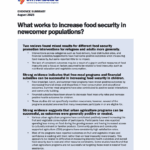Sub-Saharan African refugees in the US have reported food security rates seven times below the national average. Dietary acculturation issues may be a contributing factor. Criterion-specific sample (n = 18) was recruited using network then snowball sampling methods. Semi-structured interviews were facilitated with the aid of a culturally and linguistically appropriate interpreter. An iterative, two cycle coding analytic process was completed within NVivo 11 by two coders who sought inter-rater reliability. Codes were organized into hierarchical maps and coding matrices for direct content analysis, and pattern and theme detection. Saturation was achieved and validated with an additional two interviews. Participants were primarily Burundian (67% vs. 33% Congolese), married (72%), held no high school degree (72%), unemployed (56%) and reported limited English proficiency (72%). Barriers and facilitators to food security across all levels of the Socio-Ecological Model (SEM) were noted. Emerging themes included difficulty with language, cooking, and shopping; transportation; social network support; orientation services; reliance on nutrition assistance programs; limited culturally relevant food and land access; and program policy miscomprehension. The complex relationship between dietary acculturation barriers and facilitators at various SEM levels demonstrates the need for a multi-level intervention to improve food security among refugees.
A Systematic Review on the Impact of Trauma-Informed Education Programs on Academic and Academic-Related Functioning for Students Who Have Experienced Childhood Adversity
The purpose of this study was to conduct a systematic review of the existing literature regarding trauma-informed education programs and their impact on academic and academic-related outcomes. The articles included for review (n=15) contained data on trauma-informed education programs implemented in preschool, primary/elementary, and high school settings. Academic and academic-related outcomes reported included attendance, disciplinary…

